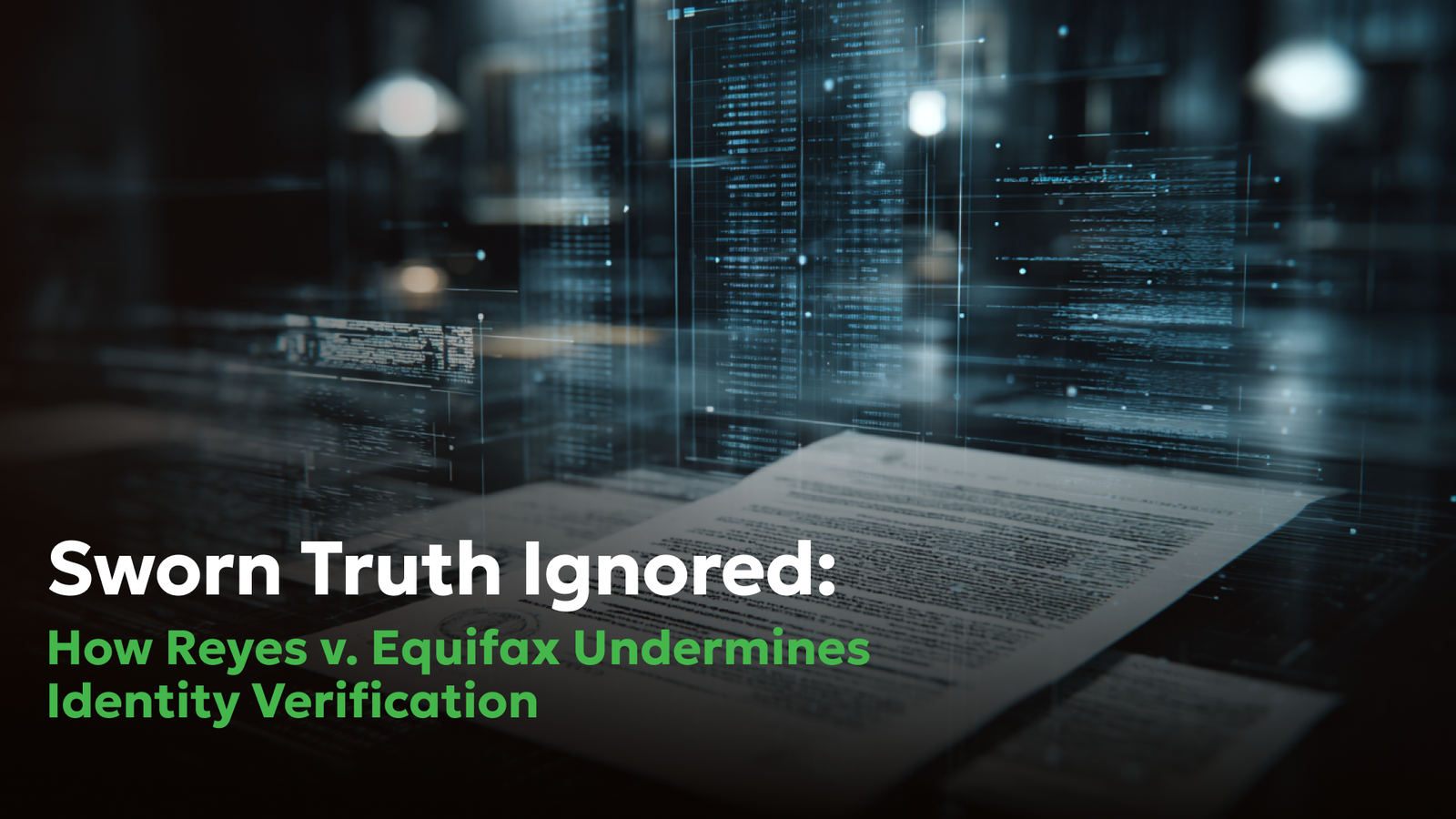What To Do If Your Identity is Stolen
- Blog
- Credit Report Identity Theft
What To Do If Your Identity is Stolen

Minimize the damage of identity theft, recover quickly, and hold companies accountable!
If you become a victim of identity theft, determining what steps to take to get back on your feet and prevent damage—financial, emotional, mental, and reputational—can be stressful. The consumer protection attorneys at Consumer Attorneys see the short-term and long-term effects of identity theft every day. We share our insights to help you recover.
Identity theft affects millions every year. It is a unique crime in many respects. Identity theft stands out because of its deeply personal and invasive nature. To think someone with bad intentions knows about you and to wonder what they know can be highly disorienting.
Unlike other crimes where the damage is often immediate and visible, identity theft stealthily undermines a person’s financial stability, reputation, and security over time. Identity theft involves stealing someone’s personal information, such as Social Security numbers, credit card details, or other deeply personal identifiers, and then using that data to commit fraud, make unauthorized purchases, open new accounts, or even obtain medical care.
Additionally, the consequences of identity theft can be long-lasting and difficult to resolve. Victims may spend months, or even years, restoring their credit, securing their identity, and dealing with the emotional distress that comes from being impersonated, stolen from, used, and defrauded.
If you find yourself a victim of identity theft, determining what steps to take to minimize all of that damage - short-term and long-term - and to recover quickly can be quite stressful.
The consumer protection attorneys at Consumer Attorneys see the consequences of identity theft daily. This article distills what we have learned about what to do if your identity is stolen. This article will explain why thieves want your identity, how they might steal it, what you should do if it is compromised, how to protect yourself, and how to recover.
What is Your Identity and Why Do Thieves Want to Steal It?
When we talk about your “identity,” we are generally talking about anything from which thieves can extract enough information to cause some damage. Your identity includes your name, Social Security number, date of birth, credit card numbers, and other personal information that uniquely identifies you. Thieves want this information because it gives them access to your money, allows them to open new accounts in your name, apply for loans, make purchases, and even commit crimes under your identity. Put more simply, thieves want this information because it is lucrative. Unlike finding someone’s wallet with some paper currency in it, identity theft offers the promise of unlimited money.
The damage can be devastating and affect your finances, credit score, reputation, mental health, emotional well-being, and physical health.
Most Common Methods of Identity Theft
Identity theft can occur in various ways, each posing a unique threat to your personal information. Here are some of the primary methods that thieves use to steal your identity:
- Phishing. This is when thieves send fake emails or set up fake websites that look like they’re from actual companies or government agencies, asking you to provide personal information.
- Physical theft. Thieves can steal wallets, purses, mail, or even go through your trash to find bills or other documents with personal information.
- Data breaches. Large-scale hacks of company databases can lead to your personal information being stolen if the company has your data on file.
- Skimming. Devices installed on ATMs or card readers can steal your credit or debit card information when you swipe your card.
- Public Wi-Fi. Using unsecured public Wi-Fi can expose your information to thieves looking to intercept the data you send and receive online.
- Social media scams. Sharing too much information on social media can give identity thieves the details they need to guess your passwords or answer your security questions.
- Mail theft. Thieves can steal your mail to get your bank statements, credit card offers, and other information that can lead to identity theft.
Identity theft can happen to anyone, anywhere, making it a pervasive threat in the digital age, where personal information is increasingly stored and transmitted online. The complexity and personal nature of the crime often leave victims feeling violated and powerless, making identity theft a uniquely challenging experience.
The New Cyber Crimes
In addition to traditional methods, new cybercrimes are emerging that make it even easier for thieves to steal your identity:
- Cryptojacking. This is when a thief uses your computer to mine cryptocurrency without your knowledge, which can give them access to your system and personal information.
- Ransomware. This type of malware locks you out of your computer files until you pay a ransom, often exposing your personal information.
- Internet of Things (IoT) Attacks. Many homes now have smart devices that are connected to the internet. Thieves can hack these devices to access your home network and steal your information.
While the methods may vary, the goal is the same. Thieves want to use your personal information to open new credit accounts, take out loans, or just spend money that will one day appear on your credit report.
Finding Out Your Identity is Stolen
You might find out your identity has been stolen in several ways:
- Unexplained Charges. You might see purchases or withdrawals you didn’t make when you check your credit card or bank statements.
- Missing Bills. If you stop receiving certain bills, it could mean someone has changed the address on your account.
- Collection Calls. Receiving calls from debt collectors about debts that aren’t yours can signify identity theft. (And some collections calls might even be identity theft attempts!)
- Credit Report Changes. You might notice accounts or activities you don’t recognize on your credit report.
The anxiety that comes from realizing that someone has stolen your identity can be overwhelming. Taking proactive steps can help manage the stress.
What to Do Next
If you suspect your identity is stolen, here are the steps you should take immediately:
- Take a deep breath. First, acknowledge your feelings; feeling violated and anxious about the uncertainty is expected. To regain a sense of control, start by taking immediate action
- Contact ONE consumer reporting agency. You need only alert one of the three major consumer reporting agencies - Equifax, Experian, and TransUnion — and ask it to put a fraud alert on your credit report. With a fraud alert, any creditor must verify your identity before issuing new credit or opening a credit account in your name. Also, you only need to contact one consumer reporting agency because it must notify the other two by law.
- Ask for a credit freeze. This prevents creditors from accessing your credit report entirely, preventing opening new accounts. How long you leave the credit freeze active depends on a few factors (see below).
- Contact the police. File a report with your local police. This is a crucial step in claiming your rights as a victim of identity theft.
- Contact the Federal Trade Commission (FTC). The FTC is a government agency that deals with identity theft cases. Filing a report with them can help you create an Identity Theft Report and a personal recovery plan.
- Create a recovery plan. This might include changing passwords and closing any unauthorized accounts. Stay organized by keeping detailed records of all communications, emails, texts, and phone calls related to the theft. Write down with whom you spoke and when.
- Contact a consumer protection lawyer. Navigating the web of complications from identity theft is absolutely best done with a well-informed legal ally, like the team at Consumer Attorneys.
- Monitor your credit report. For the next year, keep a close eye on your credit report to spot any suspicious activity. You can get a free report from each of the three credit bureaus once per year at AnnualCreditReport.com.
- Stay vigilant. Continue to monitor your bank statements and credit card statements for any signs of unauthorized activity.
- Be aware of your mental health. It's also essential to take care of your mental health. Practice stress-reducing techniques like deep breathing, meditation, or exercise. Consider speaking with a counselor if the anxiety feels unmanageable.
- Contact Someone If You See Anything Amiss. If you notice any strange activity, immediately contact your bank, credit card issuer, or any other relevant party.
Remember, recovering from identity theft takes time, and it’s okay to seek support from friends, family, or professionals as you navigate this challenging situation. It’s ok to call the police, credit card companies, consumer reporting agencies, and others to ask for updates and for help.
Credit Freeze, Credit Lock, or Fraud Alert?
When protecting your credit from identity theft, you have a few options: a credit freeze, a credit lock, and a fraud alert. Each serves a different purpose and each offers varying levels of protection.
- Credit freeze. A credit freeze, also known as a security freeze, is a tool that restricts access to your credit report, making it more difficult for identity thieves to open new accounts in your name. Most creditors need to see your credit report before opening a new account; they may not extend the credit if they can't see your file. A credit freeze does not affect your credit score, and you can lift it temporarily or permanently using a PIN or password. Freezing your credit is free by law.
- Credit lock. Like a credit freeze, a credit lock restricts access to your credit report but usually comes more conveniently. Unlike a freeze, which requires a PIN or password to lift, a credit lock can be unlocked instantly, often through a mobile app. Credit locks might be part of a subscription service with credit reporting agencies.
- Fraud alert. A fraud alert is less drastic than a freeze or lock. It tells businesses and creditors to check your credit to verify your identity before opening new accounts. This process might involve contacting you to ensure you're the person trying to take out new credit. A fraud alert is free to place and lasts for one year (or seven years if you've been a victim of identity theft and have a police report). Unlike freezes or locks, a fraud alert allows creditors to get your credit report as long as they take steps to verify your identity.
While all three options aim to protect against identity theft, freezes and locks directly block access to your credit report, with different levels of user convenience. At the same time, fraud alerts encourage additional verification steps by creditors. A consumer protection attorney can help you determine which is best for you.
How an Attorney Can Help
The consumer protection attorneys at Consumer Attorneys can help. Here’s how:
- Providing legal advice. Every situation is different. Everyone’s circumstances are different. The responses of the consumer reporting agencies and creditors can vary greatly. While we hope this article is helpful, a one-size-fits-all approach to dealing with legal issues can create problems. A consumer protection attorney can explain your rights and the best steps to take in your specific situation.
- Dealing with consumer reporting agencies. Sometimes, consumer protection agencies respond more favorably when responding to an attorney. We can help ensure that the credit bureaus take the necessary steps to mark your credit report properly and remove fraudulent information. These agencies also have a reputation for doing shoddy, inadequate, self-confirming investigations of disputed data. But when you’re working with an attorney, they can’t get away with it.
- Working with creditors. We can negotiate with creditors and debt collectors to remove fraudulent debts from your account.
- Legal representation. Sometimes, the companies in which we put our trust do not always do what they should. We can represent you in court against identity thieves or any parties that might have contributed to the financial aftermath of your identity theft.
- Preventative measures. We can advise you on how to protect your identity, potentially saving you from future theft. Things like:
- Use strong, unique passwords for online accounts and change them regularly.
- Avoid sharing sensitive information like your Social Security number unless absolutely necessary.
- Shred documents containing personal data before disposal.
- Be cautious with public Wi-Fi; avoid accessing bank accounts or entering sensitive information on unsecured networks.
- Monitor your credit reports and bank statements regularly for any unauthorized transactions.
- Consider subscribing to a credit monitoring service.
- Finally, keep your antivirus software updated and be suspicious of phishing emails and scam calls that attempt to collect your personal information.
Remember, the responsibility of consumer reporting agencies is significant in these cases. The law requires them to respond to your disputes and remove incorrect information from your credit report. If they don’t, there are steps that we can take.
If someone steals your identity, it’s essential to act quickly. By following these steps and seeking the right help, you can protect yourself and start to recover from this challenging experience. If you need legal assistance, don't hesitate to contact a consumer protection attorney at Consumer Attorneys to guide you through this process.
Frequently Asked Questions
Review your credit reports for any unfamiliar activity to check if your identity has been stolen. You can obtain a free report from each of the three major consumer reporting agencies by visiting their websites or at Annual Credit Report.com. Look for unexpected accounts or charges on credit card statements. Monitor your bank and credit card statements closely for transactions you don't recognize. Be alert for bills that don't arrive as expected or unexpected debt collection calls, which can indicate fraudulent activity. If something seems wrong, report it immediately to limit any potential damage.
Yes! You can definitely recover from identity theft - but you must take prompt and careful action. A consumer protection attorney can be invaluable in this process. They can help you navigate the legal steps necessary to clear your name, including disputing fraudulent charges, notifying police and the Federal Trade Commission, and removing unauthorized accounts from your credit report. They'll guide you in communicating with credit bureaus, creditors, and debt collectors to assert your rights under consumer protection laws. An attorney can also advise on strengthening your privacy measures to prevent future incidents. With professional legal assistance, you can restore your financial well-being and recover from the damage of identity theft.
Identity theft is a significant issue in the United States. It has affected one in three Americans—over double the global average. Over 300,000 Americans fall victim to phishing attacks, the most common cybercrime each year. The typical victims are between 30 and 39 years old, and most Americans know someone who has been affected. Shockingly, 87% of people leave personal information exposed online. Why is it so common? Because it’s lucrative for the thieves, but financially devastating to the victims. Cybercriminals are responsible for the loss of around $4 billion annually. These statistics underscore the importance of protecting personal information and being vigilant about online security.
The answer to this question is it depends. The time it takes to recover from a stolen identity will vary greatly, typically from a few weeks to several years. It depends on the severity and complexity of the theft, how fast you acted when you learned of it, and whether you have someone to help you dispute fraudulent charges, remove unauthorized accounts, resolve credit report inaccuracies, and handle legal issues. Working with a consumer protection attorney and consistently monitoring your financial statements and credit reports can help restore your financial well-being and personal sense of security more quickly.
While a scammer cannot steal your identity with just your name, having your name can be the first step in a more complex scheme to gather additional information. Scammers often combine a person’s name with other data like addresses, phone numbers, or email addresses to complete a profile that they can then use to steal your identity. To protect yourself, be cautious about sharing personal information, especially on social media, and monitor your accounts and credit reports regularly for any signs of unauthorized activity. You must also always verify the authenticity of requests for personal information.


Daniel Cohen is the Founder of Consumer Attorneys. Daniel manages the firm’s branding, marketing, client intake and business development efforts. Since 2017, he is a member of the National Association of Consumer Advocates and the National Consumer Law Center. Mr. Cohen is a nationally-recognized practitioner of consumer protection law. He has a we... Read more
Related Articles




R
ONGS™You pay nothing. The law makes them pay.







